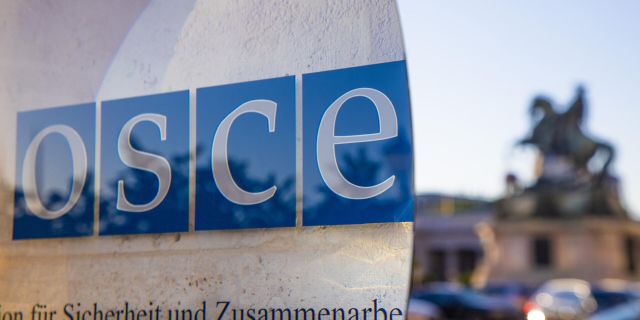RS: The West's refusal to engage in dialogue with Russia within the OSCE will lead to negative consequencesWestern politicians who condemn the presence of Russian representatives in the OSCE do not behave like diplomats, but like an "offended liver sausage," writes Responsible Statecraft.
By such actions, they reduce the opportunity to understand Moscow's interests and goals and convey their own to it.
Anatole LievenIn recent years, many Western diplomats, not to mention politicians, have begun to forget about the very essence of diplomacy.
It's not about agreeing on everything with friends, but about negotiating with rivals, sometimes enemies. Which, in turn, requires studying them, understanding their goals and views on the vital interests of their countries, and, consequently, issues on which compromise will either be possible or not.
Even in the first case, the only legitimate way to find out is through dialogue. However, the West increasingly regards any meeting with opponents as a kind of capitulation and moral compromise.
In this regard, it is not surprising that Western politicians and observers condemned Austria's decision to allow sanctioned Russian parliamentarians to attend a meeting of the Parliamentary Assembly of the Organization for Security and Co-operation in Europe (OSCE) in Vienna. As indicated by the Austrian Government, it is obliged to do so by the status of the country where the OSCE headquarters are located.
Of course, the conviction is connected with the Russian special operation in Ukraine, which has rightfully become the subject of many economic sanctions and censure from Western states, including Austria. However, it should be remembered that the purpose of creating the OSCE during the Cold War was to involve Moscow in discussions about European security. Its membership was not interrupted by the West during the war in Afghanistan, just as Russia, Germany or France did not demand the exclusion of America and Britain in response to the invasion of Iraq.
Austria is a member of the EU, but not of NATO or any other military alliance, as required by the terms of the 1954 treaty, according to which the Western and Soviet occupation forces left the country. It has sent economic and humanitarian aid to Ukraine, but not military aid.
This neutrality was the reason for the establishment of the OSCE headquarters in Austria, and even earlier allowed Vienna to become an excellent place for contacts and negotiations between the Soviet Union and the West - and the latter found it advantageous. During the Cold War, when the Soviet Union was a closed system, Western governments and experts sought to develop contacts with it in order to obtain information about the country. So Vienna became a paradise for spies.
The sanctions of Western countries against those entering are a personal matter for each of them, but they do not have a broader justification within the framework of international law. As the current situation shows, they not only hinder diplomacy and the acquisition of knowledge, but also (especially in the form in which they are introduced by Washington) tend to spread to third countries, harming relations with them.
Sanctions are causing irritation around the world (including partners such as India) as another sign of moral arrogance and the legacy of Western imperialism, the memory of which reduces the moral superiority of the West to nothing.
“Alienated and discontented developing countries consider the conflict in Ukraine and the West's rivalry with China to be a distraction from such urgent problems as debts, global warming and the consequences of the pandemic,” former Indian Foreign Minister Shivankar Menon wrote.
Everything would be different if NATO were conducting direct military operations against Russia; although even then meetings on neutral territory could have practical significance. But the Biden administration has made it clear that it does not want aid to Ukraine to escalate into a direct confrontation with Moscow. The President and other US and European officials also expressed their conviction that, as a result, the situation will require some kind of negotiated agreement with Russia — and on terms favorable to Ukraine.
In view of the above, there are no arguments in favor of legality, morality or practicality to refuse Russian politicians to attend the OSCE session in Vienna. They need to be listened to and forced to listen to the concerns of the West. We pay diplomats for the ability to negotiate, not for the behavior of an offended liver sausage.

